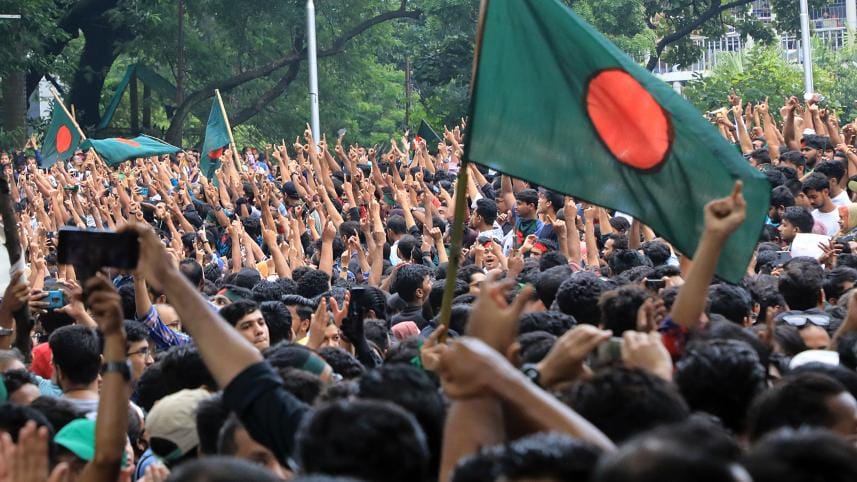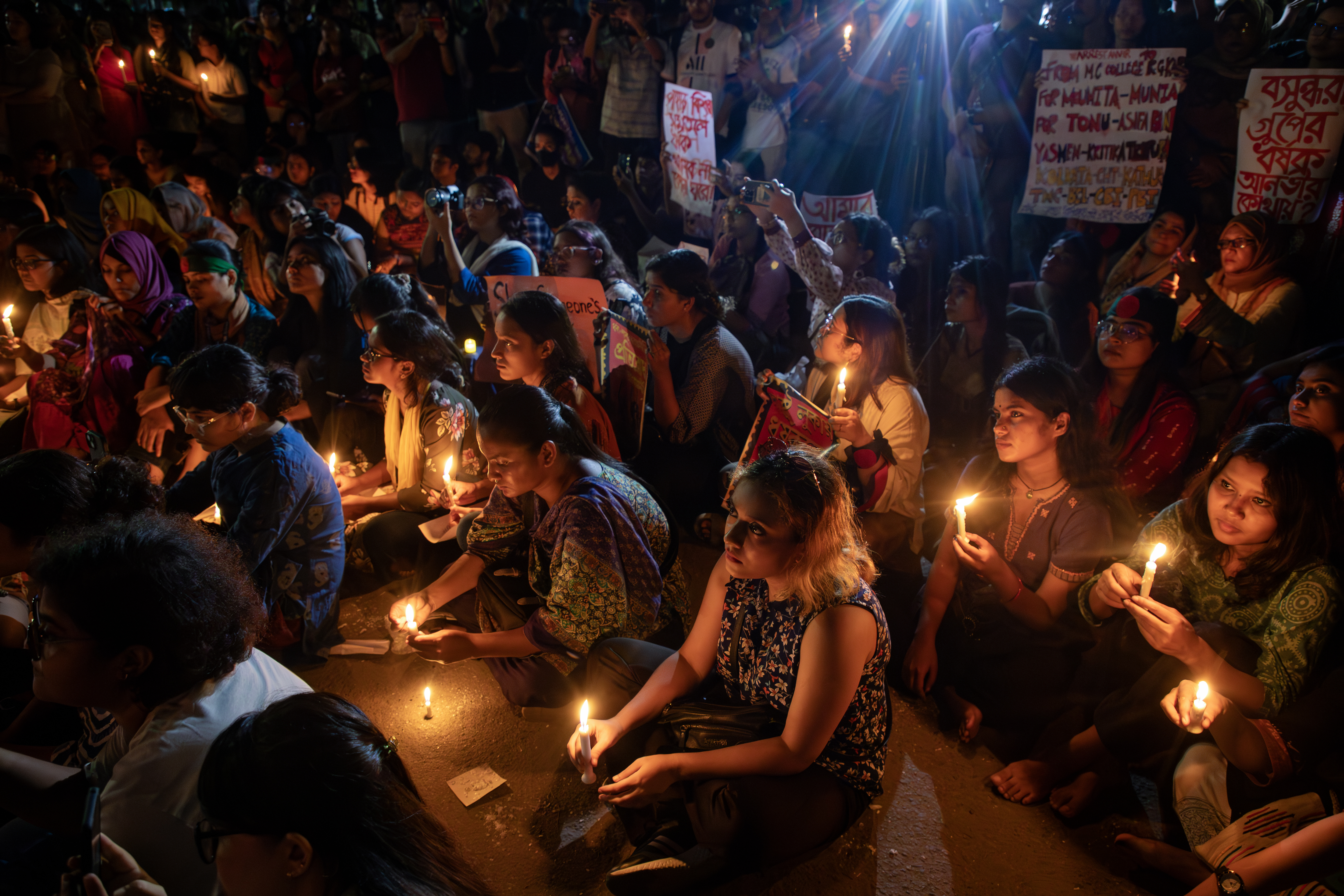Student involvement in policy and politics

The fight to free ourselves from a fascist autocracy was inseparably linked with freeing campuses from student politics – especially from the almost paramilitary student wing of the ruling party, the now banned Bangladesh Chhatra League (BCL). Agitated by years of oppression and pushed to a breaking point, the students residing in different halls in public universities ousted the BCL leadership and their henchmen. Alongside the demands of the quota reform movement, the students' wish to free their campuses from student politics also gained momentum, which saw the protests take on a new form.
The frustration against the idea of student politics on campus comes primarily from how it tends to function as lackeys of their mother party. Tasneem Zaman Labeeb, a 22-year-old student at the Institute of Business Administration (IBA), Dhaka University (DU), vents his anger, "Very early on, the protests in July morphed into protesting against an unjust system that allowed these goons to terrorise our campuses. As a student, I witnessed too many instances of them getting away with horrendous crimes. There had to be an end to it."
The truth of the matter surfaces in the cycle of violence that has been continued by representatives of student wing parties. After the fall of the Awami League regime, campuses were free from the tyranny of student politics (for a few days at least). Students were hopeful that the situation would stay that way. In their stead, methods of self-governance and judicial methods of student representation would be established. The future of Bangladesh, much like its history, would have students' voices guiding it. At least, that was what many of them hoped for.
A year after the movement, however, grassroots demand for politics-free educational institutions – which appeared to be intertwined with the ethos of the July uprising itself – was forgotten. From public to private universities, it seemed like the idea of entertaining student politics anywhere would only invite violence and chaos.
Mysha Ahmed*, a student at the Department of Statistics at DU, says, "The issue isn't in students engaging in politics. The issue comes from the fact that when we have student politicians, oftentimes their agenda has nothing to do with the students themselves or any real political change. It always ends up being a ploy to establish and maintain power through oppression."
Shaheen Alom*, a third-year student at Khulna University of Engineering and Technology (KUET), sheds light on the brutality brought forth by student wing party members, describing how their actions influenced the recent situation at KUET. He alleges that a particular political party has a stronghold over the areas surrounding the campus.
Prominent political parties tend to have vested interest in student politics continuing in its old ways. Considering the reality that emerges due to the functioning of these parties and their wings in areas surrounding campuses, how can students move forward in realising their dreams?
Reform as an idea has garnered a significant amount of popularity since August of last year. In fact, among the many changes to have come out of the uprising, one that is prominent is the increased awareness among the youth regarding politics. Following the uprising, many have taken the opportunity to educate themselves and others. As such, enthusiasts of reform did not just include those who follow political developments closely, but members of current student wing parties as well.
Sheikh Tanvir Bari Hamim, a member of the Bangladesh Jatiotabadi Chatradal, Bangladesh Nationalist Party's (BNP) student wing, shares his vision. "My dream is to rebuild the culture of political literacy and participatory democracy among students. We must go beyond slogans and create spaces where students can debate policies, draft reforms, and influence national conversations on education, freedom, justice, and the economy. We want solutions, not mere slogans. To get to the solution, there needs to be platforms to establish dialogues."
He says, "Organising workshops and seminars on democratic rights, leadership, and political ethics can help students become active citizens. Opening decentralised complaint platforms, where any student can report harassment, financial hardship, or academic injustice – these are all mechanisms we can employ to help our students. Currently, none of these things really exist at any capacity."
Globally, one solution that has been provided by countries includes platforming student voices at a parliamentary level to come up with policies and solutions that may end up affecting national policies. Youth Parliaments in the United Kingdom, for instance, have hosted debates at the House of Commons to advocate for reforms in education in 2014, which have had a profound impact on national policy. Similar examples are seen in countries such as Finland and the Philippines, showcasing the potential these youth parliaments led by student councils have.
However, given Bangladesh's political climate, will such a thing even be feasible?
Kazi Mohammad Mahbobor Rahman, a Professor at the Department of Political Science at DU, shares his expertise regarding the matter. "The root of this issue lies in how political parties treat their student wings. Is it wrong to have student wings to mother parties? That's very debatable because clearly there's a lot of value in it. But throughout history, the way our major parties have consistently neglected our students' needs and have used these student wings for wanton violence is exactly what must be stopped. The real reform needs to happen here, and it has to be carried out by the students. It is up to the students to ensure secure platforms for themselves so that their needs can be heard."
What specific actions are students expected to take, though?
Redowan Sikder, an Office Secretary at Bangladesh Chhatra Union and a third-year student at Jahangirnagar University (JU), shares his ideas. "We need to promote the independent growth of organisations filled with students involved in politics. The other major development that needs to occur is the cultivation and promotion of student councils. The practice of student councils is a very healthy way to practice democracy. Dhaka University Central Students' Union (DUCSU), for instance, is currently holding elections, but most of the students are not taking it seriously, assuming that power will be handed to someone from a student wing of a major political party. A student council is a healthy way to ensure that unlawful seizure of power does not occur and a great way of restoring faith in the democratic process."
The July uprising was the fight to free ourselves from the shackles of an autocracy. But the absence of an autocracy doesn't guarantee a democracy, neither on a national level nor within campuses. The path to reforming campus politics may take time. But incremental changes towards the right direction are worth fighting for. Will we do what's required and push for continuous reform despite the structural difficulties, though? The question remains to be answered.



 For all latest news, follow The Daily Star's Google News channel.
For all latest news, follow The Daily Star's Google News channel. 
Comments